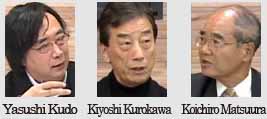Two internationally active experts have stressed that Japan should improve its declining international communication capability by, among other things, helping young people to acquire the knowledge needed for jobs with a global perspective.
Japan's ability to express its opinions about global issues to the rest of the world has been weakening as a whole, according to Koichiro Matsuura, who served as director general of the Paris-based U.N. Educational, Scientific and Cultural Organization, or UNESCO, until November 2009. Japan has yet to disappear completely from the international community, but its public image among intellectual people around the world "is becoming harder and harder to find," Matsuura said.

Today's situation surrounding Japan is even severer than in the 1980s and in the following years, during which Japan experienced phenomena called "Japan bashing" and "Japan passing," said Kiyoshi Kurokawa, a professor at the National Graduate Institute for Policy Studies. Now that Japan's ability to convey its messages to other countries is extremely weak, "we are in an era of 'Japan missing,'" he said.
The two experts were speaking as guests at the Genron NPO debate program Genron Studio, which was held Nov. 22 to discuss how today's Japan is regarded by foreign countries and what Japan must do to maintain a strong presence in the international community in the years ahead.
Referring to the March 11 devastating earthquake in northeastern Japan and the ensuing nuclear plant accident in Fukushima Prefecture, Kurokawa said that people around the world were impressed with the strength and resilience of the Japanese as they worked to overcome the disasters that were in stark contrast to the weaknesses of Japan's leaders, which became so evident post-March 11.
Japanese leaders should address the challenges facing their country in a more determined manner without becoming too satisfied with the international reputation earned by the Japanese people's perseverance following the earthquake, Matsuura said. Every Japanese person must have a sense of crisis and seriously think about the country's future so that the decision-makers will work harder to solve the challenges facing Japan.
Matsuura, who has visited 193 countries as a diplomat, stressed that it is particularly important for Japan to encourage young people to have an international perspective and an ability to convey their messages in English about what they have done and what Japan is doing.
Japan needs to recognize its weak points, which have become clearer in various fields through the latest disaster, before addressing other problems, Kurokawa said. Then, he cited specific measures necessary to enhance Japan's presence in the international community, for instance, a public support system designed to make it easier for young people to work with non-profit organizations or start as socially minded entrepreneurs.
Kurokawa, who worked as an independent physician in the United States for 15 years after going there independently, said that students should be recommended to push for a leave of absence from school to study abroad. He also said that more women must be appointed to seats on corporate boards and top posts mainly at universities as part of efforts to enable women to work in a better environment in society.